Here is what I wrote about iTunes Music Store's opening 10 years ago

A decade ago yesterday, Apple launched the iTunes Music Store and changed how we buy music. For those of you too young to remember or so old to have forgotten, Microsoft and Apple engaged in an epic struggle to dominate the fledgling legal digital music market -- all while trading in ripped files soared, despite Napster's closure. You remember it, right?
I was all too glad to pay for music, if only given the opportunity, as clearly were others. iTunes Music Store launched with 200,000 tracks -- a gigantic number at the time -- from five labels: BMG, EMI, Sony Music Entertainment, Universal and Warner. Singles priced at 99 cents, albums at $9.99, hit the sweet spot for what consumers would pay, while undercutting physical media prices. Of course, the real competition was free, pirated stuff.
As iPhone market share peaks, there's one direction to go

You will reads lots of dribble today about Samsung first quarter phone gains compared to Apple. Most will ignore something fundamental to the numbers: What they represent. IDC and Strategy Analytics separately put out data, for shipments, which mean handsets going to carriers, dealers and other sellers. That's very different from sales to businesses and consumers, Gartner's measure and the more accurate one (that data isn't ready yet).
For few quarters is the difference between shipments and sales likely to be so pronounced, actually even more so in Q2. Apple comes off its second full quarter of iPhone 5 sales and global distribution, and so shipments into the channel, nearly complete. Meanwhile, Samsung ramps up for Galaxy S4's launch, while achieving full global availability for the S III. Second quarter is the more likely bloodbath for Apple, but actual sales will foreshadow much. Still, shipments hint something now, and iPhone faces serious challenges.
Pay $180,000 for coffee with Tim Cook or buy a new house?

If you don't mind overpaying for a cup of coffee then you must read this story. Charitybuzz lists an auction which gives the highest bidder the opportunity to have coffee with Apple CEO Tim Cook at the fruit-logo company's headquarters in Cuppertino, California. The proceeds of the auction will be donated by the man himself to the RFK Center for Justice and Human Rights.
The only thing that's stopping you from grabbing that cup of coffee with one of the most influential men in tech history is, at least at the moment, a $180,000 bid. Truth be told you have to pay at least $185,000, according to Charitybuzz, in order to outbid the current leader. That's a lot by most people's standards (well, unless you're a billionaire who has a thing for charity). Well at least the terms of the auction are in your favor.
Apple Q2 2013 by the numbers: $43.6B revenue, $10.06 EPS

Today's closing bell brings answer to a question oft-asked over the past two weeks: "Will Apple profits fall for the first time in about a decade?" Not since 2003, when the fruit-logo company recovered from economic woes that sapped global PC shipments everywhere, has profit receded. Now we know.
For fiscal Q2, Apple reported $43.6 billion revenue and net profits of $9.5 billion, or $10.06 a share. Gross margin: 37.5 percent. A year earlier, the company reported revenue of $39.2 billion and $11.6 billion net quarterly profit, or $12.30 per share.
Apple needs a COO, not new CEO
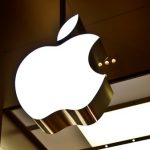
A rather fanciful and irresponsible commentary at Forbes today asserts Apple is looking for a new chief executive. "Some Wall Street sources close to some Apple executives say such a move is afoot", contributor Gene Marcial writes, without offering any more meaningful identification in that. What? Were the boys talking between toilet stalls again?
At the very best, his sources are second-hand. Hearsay. Regardless, replacing Tim Cook is the wrong solution because his management isn't the problem, nor should he be ousted simply because the stock is in freefall. The fruit-logo company is a money machine, enormous in his hands compared to predecessor Steve Jobs. What Cook lacks is what Jobs had: a chief operating officer. Apple needs to find one -- now -- and public COO search might even boost investor confidence, which lacking perplexes me, given how much money this company mints.
Does Apple Store discourage T-Mobile iPhone 5 sales?
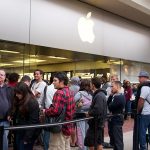
Last night, I rushed off to the local mall intent on seeing movie "Oblivion", but the 6:45 p.m. show was sold out. So I walked around and spent time inside Apple and Microsoft retail shops. At Apple Store, I had two objectives: finding out the cost of replacing a shattered iPhone 5 screen (not available, refurb phone is $229 option) and observing how the company sells T-Mobile models alongside those from AT&T, Sprint and Verizon. Pink's unlocked phone costs less upfront compared to Blue, Red and Yellow and is financed for 24 months. Apple presents T-Mobile iPhone 5 as costing considerably more.
Apple Store provides product information on iPads, which is a subtle way of promoting the devices. The marketing page presents 16GB iPhone 5 as selling "from $199" for AT&T, Sprint and Verizon and "from $649" for T-Mobile, which is technically true but also misleading. The $199 represents the big three's upfront price. T-Mobile asks about half as much, $99.99, upfront. But Apple lists T-Mobile's price as $450 more. Who wants to pay $649 when the others charge $199?
Apple sells unlocked T-Mobile iPhones
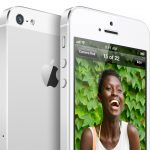
Eight days ago, iPhone 5 debuted at T-Mobile. I should have watched more carefully. The carrier also has iPhone 4 and 4S, and that surprises me. I wondered if Apple Store would carry Pink's variants, too, given the comparatively low starting price. Yes is the answer, and cleverly.
From AT&T, Sprint and Verizon, the 16GB iPhone 5 is $199 upfront with 2-year contractual commitment. T-Mobile's handset sells for $99.99 down plus 24 $20-month payments, no contract required. Surely, the three big carriers would gripe if Apple listed their phones alongside T-Mobile's for twice the upfront price. Solution: The fruit-logo company sells Pink unlocked for full price and T-Mobile SIM. But typical of Apple, expect no bargain. T-Mobile sells the phone for $579.99. Apple asks $640.
Apple loses out to premium Android tablets

UK polling company YouGov has released the results of its latest Quarterly Tablet Tracker for the first three months of 2013. It shows that consumers now see Android tablets as equal in quality to the iPad and as a result their makers are eating into Apple's share of the premium market.
Although it still has the largest slice of the UK's tablet market, Apple has seen its share drop by 10 percent in the past 12 months. Despite the launch of the iPad Mini and 4th generation iPad, Apple now has 63 percent of the market compared to 73 percent this time last year.
Facebook for iOS 6.0 adds floating chat heads
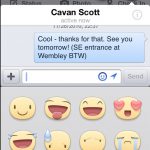
Facebook has released Facebook for iOS 6.0, a major update for its iPhone and iPad app. The major new feature in version 6 is the introduction of "chat heads", which allow users to chat from anywhere in the app -- this feature isn’t yet universally available, but should be rolled out to all users "soon", according to Facebook.
Chat heads are small circular icons representing both individual chatters and Facebook Messages. The chat head appears automatically when receiving a message, or can be manually set up by tapping the contact’s name in the contacts list.
Accidental Empires, Part 21 -- Future Computing (Chapter 15)

Twenty-first in a series. The final chapter to the first edition, circa 1991, of Robert X. Cringely's Accidental Empires concludes with some predictions prophetic and others, well...
Remember Pogo? Pogo was Doonesbury in a swamp, the first political cartoon good enough to make it off the editorial page and into the high-rent district next to the horoscope. Pogo was a ‘possum who looked as if he was dressed for a Harvard class reunion and who acted as the moral conscience for the first generation of Americans who knew how to read but had decided not to.
iPhone 5 goes on sale at T-Mobile
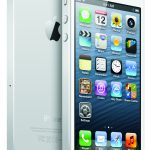
Little over two weeks ago, with much fanfare, T-Mobile announced that the iPhone 5 officially arrives in its smartphone portfolio. And, today, after a week of pre-orders, the Apple-branded handset finally goes on sale at the fourth-largest US mobile operator.
T-Mobile is the last of the four major mobile networks in the US to get the iPhone 5, after AT&T, Verizon and Sprint. Also, the iPhone 5 is the first fruit-branded smartphone to officially reach the "un-carrier" -- as T-Mobile likes to call itself -- little short of six years after the first iteration came to market.
Six ways Apple could correct its enterprise blunders

Second in a series. Out of fairness, I follow up my long analysis "The enterprise will never embrace Apple" with some advice for the company. There's room in the enterprise if only Apple made more effect. None of these suggestions is outside the reach of CEO Tim Cook and the core leadership.
Perhaps Apple stays out of the enterprise game because the top brass knows that they have little expertise in the general directions that big business is heading. Their lack of desire (or capability) for true Active Directory integration, for example, is already public knowledge. When it comes to virtualization and the move to virtual desktops, Apple has no public strategy for allowing (or supporting) such an infrastructure on OS X devices, at least first party. To put it plainly, Apple's overall game plan for cozying up to the wants of enterprise is nearly nonexistent.
The enterprise will never embrace Apple

First in a series. If there is one company that clearly doesn't care about the corporate world, it is Apple. As iOS continues to forge flagship status as Apple's core offering, OS X gets second-class-citizen treatment in every possible way from the Cupertino, Calif.-based company. While the enterprise reluctantly builds out BYOD (bring your own device) initiatives to support usage of Apple devices at the workplace, this is a far stretch from openly embracing iOS or OS X as viable corporate platforms. Apple's presence in the boardroom is due to bottom-up organic acceptance as opposed to top-down purposeful planning.
By even conservative estimates, the enterprise IT market is massive, and growing steadily as the recession continues to recede. IDC recently pinned US corporate IT spending for 2013 at $474 billion, a 6 percent increase over the previous year. And globally, Gartner says that this figure is closer to $2.679 trillion, which represents a 2.5 percent year over year bump. Yet while Apple's sales in phones and tablets continues to stay consistently solid, the company's attitude towards enterprise hasn't changed one bit. For lack of a better description, top Apple executives just "don't care".
T-Mobile announces trade-in offer for the iPhone 5
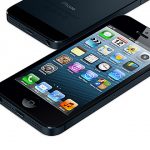
In just two days, T-Mobile customers will be able to purchase the iPhone 5. The fourth-largest carrier in the US offers the smartphone for $99.99 upfront paired with $20 monthly payments over two years, when purchased alongside the Simple Choice Plan. Also, prospective buyers can pre-order the iPhone 5 today, until April 12 when the device officially goes on sale.
In order to boost the adoption and initial sales of the iPhone 5, T-mobile is also offering users the option to trade-in another iPhone to lower the overall cost. "Our message to iPhone 4S and iPhone 4 customers is simple: bring in your device and trade up to iPhone 5 on T-Mobile", says Mike Sievert, chief marketing officer for T-Mobile. So what do you get in return?
5 million Americans cut cable's cord
What interesting timing. The same day Ericsson agrees to buy Mediaroom from Microsoft, Nielsen releases fascinating report "Free to Move Between Screens". The two things are strangely related. A decade ago, the IPTV division made more sense. Today, television habits are changing, something Microsoft brianiacs apparently recognize and others would be wise to do likewise. Nielsen hints at the future.
Consider where we are in just three years. Before iPad's launch in April 2010, few US television networks (I don't know that any) offered two-screen experiences. Now they're commonplace, under the presumption millions of Americans sit with tablets in front of their boob tubes (and they do). HBO Go launched two months earlier. Go back six years, you have Amazon, Apple and Netflix streaming and Hulu's launch. Along with the DVR's rise in popularity, how Americans consume television programming dramatically changes.
Recent Headlines
Most Commented Stories
This updated Windows 11 clone is Linux underneath and makes your old PC run faster -- get it now
The brilliant Windows 12 is everything Windows 11 isn't -- and the Microsoft OS we deserve
Microsoft releases Windows 11 25H2 ISOs
Microsoft is rolling out Windows 11 25H2
BetaNews, your source for breaking tech news, reviews, and in-depth reporting since 1998.
© 1998-2025 BetaNews, Inc. All Rights Reserved. About Us - Privacy Policy - Cookie Policy - Sitemap.